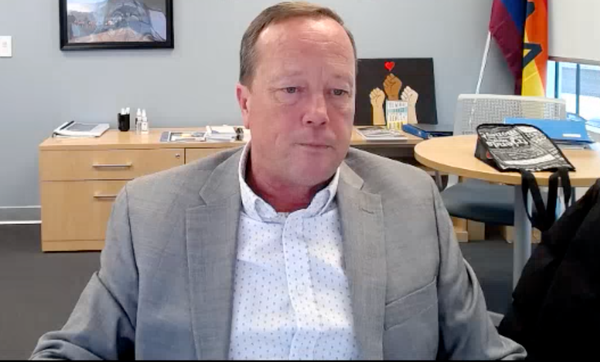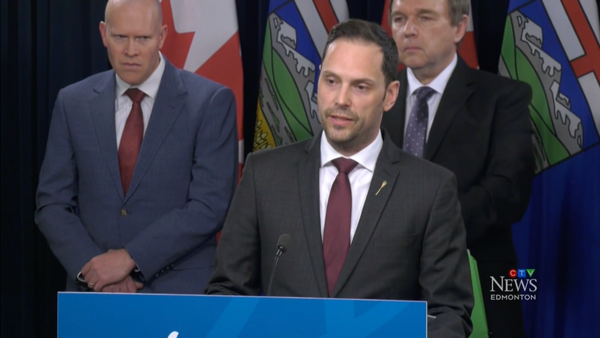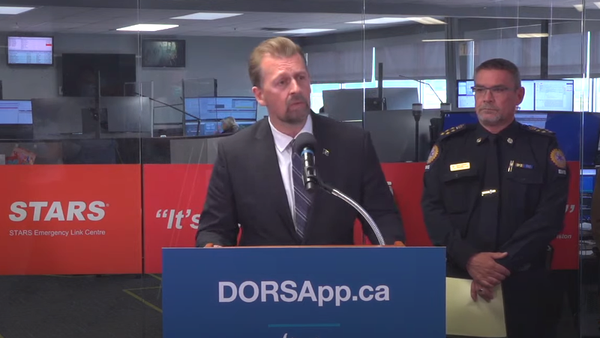Alberta to eliminate due process for people who use drugs
The Alberta government is going full MAGA with its Compassionate Intervention Act, which will strip people who use drugs of due process and force them into months-long medical incarceration.

On April 8, the American Immigration and Customs Enforcement (ICE) director Todd Lyons sent shivers through human rights and legal communities by suggesting he aims to run immigrant deportations like “[Amazon] Prime, but for human beings.”
Days later, Alberta's United Conservative government has announced that it too will be eliminating due process for people it has long aimed to remove from public. The so-called Compassionate Intervention Act (CIA) will force people who use drugs into abstinence and potentially indefinite detainment, with seemingly few channels for legal defence.
The CIA provides police, families, medical practitioners and others the power to seek an order compelling people who use drugs into medical incarceration for "up to 9 months, with possible renewal,” according to the released documents. Once an application is made, an order to seize an individual is made by a lawyer for the "compassionate intervention commission." Police then seize and transport the individual to a facility for a 72-hour detox and assessment.
Next, a panel comprising a doctor, a lawyer and an undefined member of the public reviews the individual's "potential harm to self or others," following which a decision is made on whether the individual will enter confinement at a secure facility or a community-based setting, such as a private residential treatment facility.
While individuals are technically entitled to appeal these rulings, it is unclear what legal supports will be made available to people who cannot afford them, particularly since legal aid has been gutted under the UCP government.
The UCP government has modelled the CIA most closely on the Protection of Children Abusing Drugs Act (PChAD), which came into effect in 2006 and remains Canada’s most punitive legislation on youth drug use. PChAD enables parents or guardians to seek a court order to have police seize and transport their children into confinement for up to 15 days, considerably shorter than the periods proposed by the CIA but with no medical review required.
Once confined, children can be subjected to “social detox,” a euphemism for cold-turkey withdrawal and considered torture under international convention. The CIA dictates that inmates cannot refuse medication, which presents new dangers as opioid withdrawal medications must be carefully tailored for each individual — and for many, they don’t work at all.
New documents obtained by Drug Data Decoded reveal that an average of 440 children were forced into PChAD each year from 2016 to 2024, with some children admitted multiple times per year. No deaths were recorded in PChAD facilities during that period, but the downstream impact of the program on children’s survival has never been studied — even despite urging by the Child and Youth Advocate.

According to Bill 53, the CIA is not intended only for adults. Rather, it replaces PChAD, meaning the current limit of fifteen days children can be held in forced withdrawal could be extended to many months or indefinitely.
Since its early efforts to collect personal health numbers at supervised consumption sites, the UCP government has shown a growing interest in gathering personal data of people who use drugs in the province. In 2022, the government introduced My Recovery Plan, a privately owned app that harvests personal health information of people accessing recovery services. Drug Data Decoded recently revealed that the government now requires the app’s use by all clients entering detox facilities, despite many clients being “not in a place” to fill out the app's intake questionnaire.
Therefore, clients with the greatest support needs are the most likely to be denied service if they cannot clear the initial technological hurdle. But after the UCP's years-long war on supervised consumption, regulated pharmaceutical drug supplies, frontline medical supports and social housing, many people will be left with no option but to face a CIA panel.
In early 2024, the UCP government unveiled a partnership with Edmonton police and Bowline, a subsidiary of privately owned and government-affiliated ROSC Solutions Group, to open “navigation centres.” At these sites, people evicted from encampments would ostensibly gain access to government-approved services, though most people made efforts to avoid them. Personal data were also collected at the sites, which later opened across the province.

Shortly after the government's Compassionate Intervention Act announcement on April 15, Courtney Theriault interviewed author Euan Thomson.
With Indigenous people comprising upwards of 60 per cent of unhoused individuals in Alberta cities, 40 per cent of incarcerated people in western provincial prisons, and 40 per cent of children forced into PChAD, the likelihood that the CIA will aggravate Indigenous mass incarceration is a stark reminder that Alberta has yet to leave its residential school legacy in the past.
A key update to that model is how corporations have embraced government-contracted service delivery alongside religious institutions. As the ICE director asserted in his statement, “let the badge and guns do the badge and gun stuff... everything else, let’s contract out.”
Albertans looking to get their “elbows up“ against MAGA may identify the MAGA threat now in plain sight in their own province: armed seizure of people deemed undesirable by the state and their rendition into incarceration without due process is at the heart of the constitutional crisis playing out in the US.
The CIA will undergo up to three weeks' review and debate in the legislature before its inevitable passing by the ruling party.
If you have additional information, please get in touch at info@drugdatadecoded.ca, where media can also request FOIP documents.
This story was shared with Paid subscribers the morning of April 16 and made publicly available later the same day.
Call for support: Know professionals or academics who might be interested in supporting this work? They are likely eligible to claim subscription costs for professional development – please encourage them to chip in.
Drug Data Decoded provides analysis using news sources, publicly available data sets and freedom of information submissions, from which the author draws reasonable opinions. The author is not a journalist.






